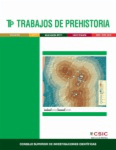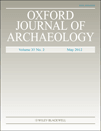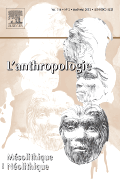
Bulletin de la Societe Prehistorique Francaise
Scope & Guideline
Unveiling the Mysteries of Our Ancestors
Introduction
Aims and Scopes
- Archaeology of Prehistoric Societies:
The journal extensively covers archaeological studies from various periods, including Paleolithic, Mesolithic, Neolithic, and Bronze Age, emphasizing the excavation and interpretation of sites. - Cultural Practices and Symbolism:
Research often explores the cultural artifacts, burial practices, and artistic expressions of prehistoric communities, revealing insights into their social structures and belief systems. - Technological and Economic Aspects:
There is a strong focus on the technological innovations and economic behaviors of prehistoric populations, including tool-making techniques and subsistence strategies. - Interdisciplinary Approaches:
The journal encourages interdisciplinary collaboration, integrating methods from anthropology, geology, and environmental sciences to enrich archaeological findings. - Regional Studies:
Particular attention is given to regional studies, with publications highlighting the specific archaeological contexts of various geographical areas, especially in France and surrounding regions.
Trending and Emerging
- Social Structures and Gender Studies:
There is an increasing emphasis on understanding social hierarchies and gender roles in prehistoric societies, moving beyond traditional narratives to include women's contributions and perspectives. - Interconnectivity and Cultural Exchange:
Recent publications are exploring themes of interconnectivity, trade, and cultural exchanges among prehistoric communities, indicating a growing interest in understanding the networks that shaped ancient societies. - Environmental Archaeology:
Studies focusing on the interactions between prehistoric societies and their environments are emerging, particularly in the context of climate change and resource management, reflecting a broader concern for ecological sustainability. - Digital Archaeology and Technological Innovations:
The integration of digital tools and methodologies in archaeological research is on the rise, with an emphasis on using technology for data visualization, analysis, and public engagement. - Cognitive Archaeology:
There is a growing interest in cognitive archaeology, exploring the mental and cultural frameworks of prehistoric peoples through their material culture, which is being increasingly reflected in recent studies.
Declining or Waning
- Late Bronze Age Studies:
Research on the Late Bronze Age has seen a decrease, with fewer publications exploring this period compared to earlier years. This may indicate a shift towards earlier prehistoric periods or a saturation of existing research. - Bioarchaeology and Human Remains:
While still present, the exploration of bioarchaeology and the analysis of human remains have become less frequent, possibly due to ethical considerations or a declining interest in this specific aspect of prehistoric research. - Technological Studies of Early Metals:
The focus on the technological studies surrounding early metallurgy and metal artifacts from the Bronze Age appears to be waning, suggesting a pivot towards more comprehensive studies of earlier lithic technologies.
Similar Journals

JOURNAL OF WORLD PREHISTORY
Transforming Archaeological Knowledge for Tomorrow's ScholarsJOURNAL OF WORLD PREHISTORY, published by SPRINGER, stands as a premier platform for disseminating pioneering research and scholarship in the field of archaeology. Boasting a prestigious Q1 status in Archeology and a remarkable 97th percentile ranking in its category, this journal has made significant contributions to the understanding of global prehistory since its inception in 1987. It serves as an invaluable resource for researchers, professionals, and students alike, providing access to high-quality articles that explore diverse archaeological methodologies, theoretical frameworks, and case studies. Although it is not an open-access journal, its impact and relevance continue to resonate within the academic community, fostering critical discussions and advancing knowledge in this vital discipline. With publications converging from 2006 and set to continue until 2024, the JOURNAL OF WORLD PREHISTORY remains committed to advancing archaeological research and enhancing interdisciplinary collaboration.

ARCHAEOLOGY
Connecting History with Contemporary RelevanceARCHAEOLOGY is a distinguished peer-reviewed journal published by the Archaeological Institute of America, focusing on the multifaceted aspects of archaeological research and its relevance to contemporary society. Established in 1966, this journal serves as a critical platform for scholarly discourse in the field, showcasing innovative findings, theoretical advancements, and methodological discussions related to archaeology. While it maintains a Q4 ranking within the disciplines of archaeology and arts and humanities, its contributions remain valuable for those engaging in archaeological studies or seeking to understand historical and cultural narratives. The journal is accessible in print, with an ISSN of 0003-8113 and an E-ISSN of 1943-5746, ensuring that a wide audience can benefit from its insights. Although currently not classified as Open Access, the meticulous peer-review process ensures a high standard of academic rigor, making it an essential source for researchers, professionals, and students alike who are dedicated to exploring the past through archaeological lenses.

Mediterranean Archaeology & Archaeometry
Charting New Territories in Mediterranean StudiesMediterranean Archaeology & Archaeometry is a premier academic journal dedicated to advancing the fields of archaeology, anthropology, conservation, and history, published by UK Zhende Publishing Ltd. With its ISSN 1108-9628 and E-ISSN 2241-8121, this journal serves as a vital platform for scholars and practitioners to disseminate innovative research and findings related to the rich archaeological heritage of the Mediterranean region. It has gained remarkable recognition, achieving a Q2 ranking in anthropology and archaeology, and a Q1 classification in several categories including arts and humanities, conservation, and history as of 2023. Its impressive Scopus rankings underscore its impact, with a significant position in history (59/1760) and conservation (11/103) disciplines. Spanning years from 2008 to 2022, the journal invites open access contributions to foster collaboration and interdisciplinary dialogue among researchers, students, and professionals alike, making it an indispensable resource for those engaged in the exploration and preservation of historical narratives within the Mediterranean context.

Ancient Asia-Journal of the Society of South Asian Archaeology
Advancing Knowledge of South Asia's Archaeological TreasuresAncient Asia - Journal of the Society of South Asian Archaeology, published by ARF India, stands as a pivotal resource for the exploration and dissemination of archaeological research focused on the rich history and culture of South Asia. Since its inception as an Open Access journal in 2006, it has become an essential platform for scholars and enthusiasts alike, boasting an impressive range of quartile rankings across multiple disciplines, including Anthropology, Archaeology, History, and Visual Arts. With expansion into various indexed categories and consistent dissemination of impactful research common to this highly diverse field, Ancient Asia aims to foster interdisciplinary dialogue, facilitate collaboration among researchers, and enhance the global understanding of ancient civilizations within the region. By embracing an inclusive access model, the journal encourages wide readership and engagement, positioning itself as a key player for students, professionals, and academics interested in delving into the archaeological marvels of South Asia.

Time & Mind-The Journal of Archaeology Consciousness and Culture
Decoding Cultural Practices Through TimeTime & Mind - The Journal of Archaeology Consciousness and Culture, published by Routledge Journals, Taylor & Francis Ltd, stands at the intersection of archaeology and consciousness studies, revealing the intricate relationship between cultural practices and human cognition. With a robust ISSN of 1751-696X and an E-ISSN of 1751-6978, this esteemed journal plays a vital role in fostering interdisciplinary dialogue among scholars in the realms of anthropology and archaeology. Notably recognized for its rigorous academic standards, it achieved a commendable Q2 category ranking across various fields in 2023, including Anthropology and Archeology, alongside impressive Scopus rankings. As it continues to publish cutting-edge research from 2008 to 2024, this journal remains dedicated to exploring the nuances of human experience through the lens of archaeological evidence, making it an indispensable resource for researchers, professionals, and students alike seeking to deepen their understanding of the cultural dimensions of consciousness.

Trabajos de Prehistoria
Connecting Scholars Worldwide to Unravel the Mysteries of Human HistoryTrabajos de Prehistoria is a distinguished peer-reviewed journal published by the Consejo Superior de Investigaciones Científicas (CSIC) since 1988, and it has established itself as a vital resource in the field of archaeology and prehistory. With an impressive impact factor and an open access policy, the journal aims to disseminate high-quality research that contributes to the understanding of human history and prehistorical studies. This Spanish journal has consistently ranked in the top quartile (Q1) in both the Arts and Humanities and Social Sciences categories, reflecting its significance in advancing archaeological scholarship, with Scopus rankings placing it in the 85th percentile among its peers. Covering a broad scope of topics related to archaeology, it serves as a platform for innovative research that connects researchers, professionals, and students globally, enhancing academic dialogue and fostering interdisciplinary collaboration. Based in Madrid, European researchers and global academics alike benefit from its open access model, promoting wider distribution and accessibility of foundational studies in the field.

Adalya
Illuminating the Legacy of Mediterranean CulturesAdalya, published by the esteemed Koc University Suna & Inan Kirac Research Center for Mediterranean Civilizations (AKMED), is a prominent academic journal dedicated to the fields of Archeology, History, and Conservation. With an ISSN of 1301-2746, this journal serves as an essential platform for scholars and researchers, fostering insightful discussions and disseminating significant findings about Mediterranean civilizations. Recognized in the quartile rankings of Q3 in Archeology and Q2 in both Conservation and History for the year 2023, Adalya reflects an impactful presence in its respective disciplines. Although it operates under a traditional subscription model, the journal remains accessible to a diverse audience interested in the nuanced exploration of historical contexts and conservation practices. Located in Antalya, Turkey, the journal has carved out a niche since its inception in 2009, bridging the past and present through rigorous academic inquiry. Whether you are a seasoned researcher or a student eager to deepen your understanding of Mediterranean cultures, Adalya offers invaluable resources and perspectives that enrich the academic community.

Oxford Journal of Archaeology
Uncovering the Past, Shaping the FutureOxford Journal of Archaeology is a prestigious peer-reviewed journal published by WILEY, dedicated to advancing the field of archaeology through innovative research and insightful discourse. Established in 1982, this journal has become a vital resource, showcasing high-impact studies that resonate within the arts and humanities, as well as interdisciplinary fields such as geography and planning. With an impressive Q1 ranking in both Archaeology and Arts & Humanities categories, and a Q2 ranking in Geography, Planning, and Development, the journal consistently maintains its reputation for excellence—evidenced by its ranking in the 81st percentile within the Scopus Arts and Humanities Archaeology category. The Oxford Journal of Archaeology not only provides scholars, professionals, and students with access to cutting-edge archaeological research but also encourages collaboration and dialogue among a diverse academic community. Although the journal does not currently offer Open Access, it remains a crucial platform for those seeking to expand their knowledge and impact in this dynamic field.

Bulletin of the American Society of Overseas Research
Exploring the depths of archaeology and history for a richer tomorrow.Bulletin of the American Society of Overseas Research, published by the University of Chicago Press, serves as a premier platform for scholarly discourse in the fields of archaeology, cultural studies, and history. With its ISSN 2769-3600 and E-ISSN 2769-3589, this journal has swiftly established itself as a key resource for researchers, professionals, and students alike, demonstrating exceptional impact as evidenced by its Q1 rankings in multiple relevant categories for 2023. Notably, it holds the 93rd percentile rank in Arts and Humanities (History) and the 84th percentile in Social Sciences (Cultural Studies), evidencing its respected standing within the academic community. The journal's commitment to advancing knowledge and fostering interdisciplinary dialogue is complemented by its accessible publication from 2022 to 2024, making it an essential read for those engaged in the exploration of global cultural histories and archaeological research.

ANTHROPOLOGIE
Illuminating the Intersection of Culture and PhilosophyANTHROPOLOGIE, published by Elsevier France - Éditions Scientifiques Médicales Elsevier, is a leading academic journal dedicated to advancing the fields of Anthropology and the History and Philosophy of Science. With a publication history that dates back to 1947, this esteemed journal has steadily carved its niche within the scholarly community, achieving a commendable Q2 rank in both the aforementioned categories in 2023. Although it does not offer Open Access, ANTHROPOLOGIE provides robust access options through institutional subscriptions, ensuring that researchers and practitioners alike can delve into its rich repository of knowledge. The journal's impact is underscored by its competitive Scopus rankings, particularly its position within the 65th percentile for History and Philosophy of Science and 56th percentile within Anthropology. Through rigorous peer-reviewed articles that illuminate a wide array of anthropological inquiries and philosophical debates, ANTHROPOLOGIE continues to be an essential resource for those committed to exploring the complexities of human behavior, culture, and scientific understanding in an ever-evolving world.